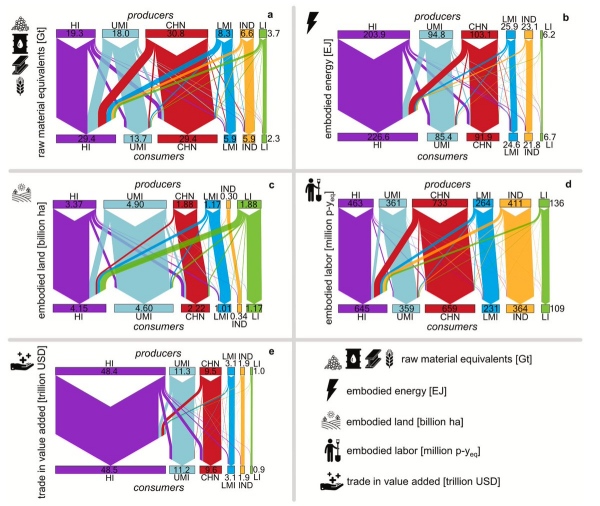Study gives more evidence that certain high-tech utopias are utopias
Nothing new, probably. But it’s good when more data prove certain things
(the text that follows is my own synthesis, because ThreaderApp is bad of a recent Twitter thread)
The thread summarizes certain conclusions from a study about why and how economic growth in high-income nations occurs at the expense of poorer countries.
The analyses in the study, summarized in the graphs below, show that:
- the embodied flows of materials, energy, land, and labor, shows that rich countries (in purple) used more resources from a consumption perspective than they provided through production.
- high-income countries are the largest net appropriators of land, and the situation is the same for materials, energy, and labor.
- that appropriation enabled those countries to accumulate a monetary trade surplus of approximately 1200 trillion USD over the 1990–2015.

<u><em><strong>CAPTION:</strong>
<a href="/img/embodied-flows.jpg" target="_blank">Click for larger version, see the full study for explanation</a>
</em></u>
What these (not) news and data really tell us
In standardized accountings of trade, money and materials flow in opposite directions. But when embodied resources are considered, net flows of money and resources goes in the same direction.
The overall result is that “Rich nations accomplish a net appropriation of materials, energy, land, and labor”.
And what is really interesting (not because it is new, but because how it is backed and quantified by data) is the final implication:
[Regardless of moral and ethics issues] "we cannot all grow. Since this growth-based model of development requires the appropriation of resources from poorer regions, it seems illusory for all poorer nations to be able to catch-up", and if those countries must develop, the richer ones have to give up something.
Why you find this here?
You may wonder why such a study is mentioned on a website whose mission is to show how human rights and quality of life heavily depend on how digital technologies are used around us.
The answer is easy, and is all in that four-words conclusion that “we cannot all grow”. Because that conclusion is one more proof, backed by research, that certain “electrification strategies” cannot work as advertised. Not for enough people to last and make a real difference, at least. Of course, the same conclusion applies to any other grandiose, hi-tech dream based on flooding the planet with electronics, like much IoT is today.
Who writes this, why, and how to help
I am Marco Fioretti, tech writer and aspiring polymath doing human-digital research and popularization.
I do it because YOUR civil rights and the quality of YOUR life depend every year more on how software is used AROUND you.
To this end, I have already shared more than a million words on this blog, without any paywall or user tracking, and am sharing the next million through a newsletter, also without any paywall.
The more direct support I get, the more I can continue to inform for free parents, teachers, decision makers, and everybody else who should know more stuff like this. You can support me with paid subscriptions to my newsletter, donations via PayPal (mfioretti@nexaima.net) or LiberaPay, or in any of the other ways listed here.THANKS for your support!